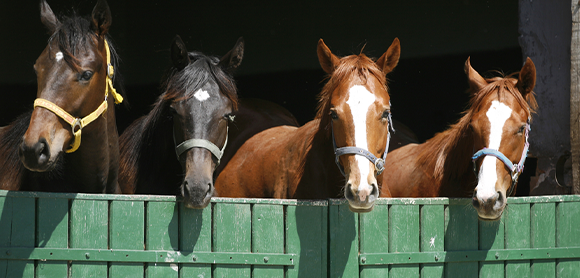
How to keep a horse entertained in winter
Over the winter, it’s inevitable that some of our horses end up spending more time indoors or in smaller paddocks. Keeping your horse entertained can help reduce stress. Check out our top tips from Petplan Equine veterinary expert Gil Riley.
If your paddocks are poached and your fields are flooded over the winter, you might have no option other than to keep your horse in their stable or a small paddock more often. Frozen ground can also lead to injuries and even vet-prescribed box rest for some. In this post, we talk to Petplan Equine veterinary expert Gil Riley about how to keep your horse happy while they’re on limited turnout or box rest.
Why is it important to keep stabled horses entertained?
Being stabled for long periods of time can quickly make horses bored. If left unresolved, ‘stress can lead to health problems and agitated behaviour,’ explains Gil. The can lead to, or aggravate, common behavioural issues, such as:
- Bed-digging
- Box walking
- Weaving
- Crib-biting
- Wind-sucking
‘By meeting their natural needs,’ Gil says, ‘it’s possible to keep a stabled horse satisfied and stress-free.’ So what can we do as owners to reduce the risk of our horses feeling stressed?
4 tried and tested horse boredom breakers
Adding enrichment to your horse’s stable can help give them something to do. As every horse is an individual, we recommend experimenting with different options to find what suits your horse.
1. Keep them in company
‘Horses are prey animals, designed to be moving and foraging. They have a strong herd instinct and feel happier and safer in company,’ Gil says. He recommends making sure that you ‘allow your horse a view of others - ideally horses that they like and get on with.’
If you’ve got the facilities, allow your horse some time out with a good friend, even if it’s in a school or dry paddock. Gil says they’ll both ‘enjoy the opportunity to socialise and indulge in some natural behaviours such as mutual grooming’.
2. Add a stable mirror
Did you know that horses can’t recognise their own reflection? If bringing a friend in for your horse isn’t an option, you can try adding a stable mirror to give your horse a sense of company.
‘Use a shatterproof safety mirror and experiment to see if your horse is happy with it,’ says Gil, who stresses that a reflected ‘friend’ should never be used as a long-term substitute for time and social interactions with other horses.
3. Treat them!
Treat-dispensing balls are a great way to extend your horse’s feeding time. And it’s easy to fill them with something that meets your horse’s dietary requirements — Gil suggests low-calorie grass nuts.
Try hanging a lick block from a beam rather than resting on the wall. Gil says ‘your horse will have to play with it to bring it under control. They’ll either love it or ignore it, so it shouldn’t cause any frustration or untoward behaviour.’
4. Bring foraging indoors
If you do your research, finding a few different types of plants to hide in your horse’s haynet, or hang in their stable, can substitute for the natural foraging they might do in their field. Suggestions include willow, hawthorn and thistles, but check out our foraging guide first!
How much should you feed a horse on box rest?
As Gil says: ‘Food provides comfort.’ So slowing the rate at which your horse eats is an important part of keeping them happy and healthy. He adds that ‘boredom and stress can lead to stomach ulceration’.
Plenty of forage is essential
Forage mops up excess acid in the stomach, while being busy chewing will help pacify a horse’s nerves. Gil recommends ‘double-netting your horse’s hay or using a net with smaller holes to make your horse’s meals last longer.’ Placing multiple hay nets around the stable is also a good way to spread out how long your horse spends eating.
‘You can also feed a good-quality oat or barley straw instead of hay,’ Gil says. ‘All of these forage alternatives are palatable, low-energy and take up a lot of room in the stomach, keeping the horse full and satisfied.’
Other things to do for a horse on box rest or limited turnout
In-hand exercises are a great way to keep your horse’s body supple and their mind active when they’re spending more time indoors.
Adapting your horse’s grooming regime to suit the winter months can leave them looking and feeling great by the time spring finally rolls around.
We can all look forward to the evenings getting brighter and the ground getting dryer soon. In the meantime, we’d love to hear if you’ve got any additional tips, or ways that your horse keeps you entertained over the Winter. Head over to our Facebook page and share your stories or funny photos!



